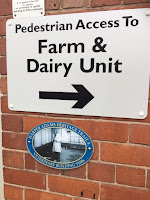I have a writer friend – let’s call her Jane – who recently divulged that she’s been a member of the Romantic Novelists' Association for twenty years and has never been to a conference.
I know – what a shame!
 |
| Goody bag |
I’ve been to 8 conferences, and I always come away brimming with ideas and motivation and a hangover. This year the RNA conference was held at Harper Adams University, and I thought I’d write a post about it – because if Jane knew what went on there, she’d want to try it for herself, right?
So what happens at an annual gathering of romance-loving writers? And aside from receiving a free goody bag (with chocolate and free books - Jane will like those!), what’s in it for you?
1. It’s informative:
 |
| Industry panel (photo by John Jackson) |
Because the RNA is a professional body, it offers the rare opportunity to glean from the experts their insights into the current state of the publishing industry and future trends.
This year the conference kicked off with an industry panel made up of agents and publishers. What they had to say was positive: people are still reading a lot (sales of books were steady year on year), and romance and crime are the most popular genres (6 out of 10 books sold are romance). In the UK, sagas are especially sought after (although readers are wary of longer books), and there is more of a mash-up of genres developing: for example, we’re now seeing domestic thrillers with a sexy edge.
2. Industry appointments:
The conference gives writers the rare opportunity to pitch to agents and publishers, and also freelance editors, all of whom give feedback on your submission. I previously blogged about my experience here and it was through one of these appointments that I got my first book deal with Accent press.
3. Bestselling writers:
 |
| Kate Johnson interviewing Jill Mansell |
There’s nothing more exciting than meeting your heroes, and this year’s conference had its fair share of big names in the romance world.
Jill Mansell talked about her writing method (by hand, with the television on and using post-its to plot ahead), why she likes to use a village setting in her books, and her solution for when she’s stuck with the plot (throw in a new character!).
And Sarah Morgan and Nicola Cornick gave a workshop on Using Social Media which stressed the importance of engaging with your readers and driving as many followers as possible to your newsletter. (I’m a huge fan of Sarah’s and was very excited to get my book signed after her workshop!)
 |
| Sarah Morgan and Nicola Cornick |
 |
| Fiona Harper |
4. Writing craft workshops:
There’s the chance to learn or refine your writing skills, with two days packed full of workshops.
I always find it useful to step away from my novel-in-progress and ask myself questions such as What is your character’s goal? This was one of 10 questions which Fiona Harper gave us in her workshop, Building Characters From the Inside Out, which focused on developing a strong character arc and that inner growth which makes a novel so satisfying to read.
5. Inspiration:
There’s inspiration everywhere at the conference – in other writers’ success stories, the workshops, in the books which are for sale! How often do you get the opportunity to work with a life coach or learn about screenwriting?
Sonia Duggan taught us that our brains are instinctively risk-averse, yet the most exciting ideas usually involve stepping out of our comfort zones. She gave us tips to help us be less fearful in our writing, because if you’re willing to take risks, anything is possible!
6. Fun and friendship:
There’s nothing more motivating than spending time with writing friends – and making new friends too.
 |
| Novelistas Sophie Claire & Annie Burrows |
Hearing about other people’s experiences and their methods of working, or about new opportunities is always beneficial.
The RNA is a wonderfully warm community, people are generous with their help and advice, and I’ve always been made to feel welcome.
 |
| The Gala Dinner |
First-time conference goers (are you listening, Jane?) have the chance to join an online group so they can ask questions beforehand and meet others in the same boat when they arrive. Their name badges bear a little sparkly sticker so the rest of us know to make them feel especially welcome.
Plus there’s wine – lots of wine (600 bottles, to be precise). What’s not to like?!
7. Time to think:
I’ve learned that I get more out of the conference if I allow myself breaks, and since Harper Adams University is an agricultural college, I decided to explore the grounds and look for the source of the pungent farmyard smell which permeated everywhere!
Although I didn’t find it, it was time well spent, letting my mind wander and chewing over all I’d taken in.
Time out from daily responsibilities is good for the creative mind. It gives you space to breathe, to explore new ideas and be reminded of the important stuff – like your long-term goals and priorities.
Now I’m home again, and back to the daily routine...
...but feeling re-energised, and I have plans and ideas which I’m excited about. The conference always has this effect: it motivates me and makes me more productive.
So I wonder – will Jane be persuaded to try it next year? Will you?
Sophie.x
Photos copyright: John Jackson and Sophie Claire






















